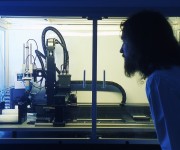27/06/2016
A NEW STRATEGY AGAINST CANCER: HITTING THE PROTEASOME AND THE MIATED PROTEIN P53
THE RESEARCH COORDINATED BY LNCIB OF TRIESTE PUBLISHED ON NATURE CELL BIOLOGY
Il Parco
The proteasome is the system that the cell normally uses to dispose of protein waste and to renew proteins. This molecular apparatus is crucial for the survival of the cells. Even a cancer cell has to resort to it in order to continue to multiply, to cope with the stress to which it is subjected, and to get rid of many of the molecules that act as a brake of the malignant transformation. This is exactly the scientific rationale that has led, for some years now, to considering the proteasome an ideal target for a precision drug against cancer. The result is a class of anti-cancer drugs capable of inhibiting that function.
Among the targeted therapies that arrive at the bedside of the patient, or in late-stages of clinical trials, the treatment with drugs such as bortezomib or proteasome inhibitors of the latest generation such as carfilzomib has created great expectations and the use of these drugs is today approved to fight the multiple myeloma. In some cases, however, the tumour can also resist the treatment and in clinical studies conducted to date in relation to solid tumours – like those affecting the breast or lungs, for example – these drugs have disappointed, in part, therapeutic expectations. In fact, it may occur that while the active ingredient stops the operation of the proteasome, in response the cancer cell stimulates to the maximum the expression of the genes coding the various components of this molecular apparatus, so as to restore or even augment its activity, hampering any therapeutic effort. This is a complex mechanism, not entirely understood. So far.
A research coordinated by Giannino Del Sal from the CIB National Laboratory of the AREA Science Park in Trieste and published online today by the international scientific magazine Nature Cell Biology clarifies the molecular basis of this phenomenon. When a tumour has mutations in the TP53 gene, it is precisely the product of this altered gene – the mutated p53 protein – which controls and activates the expression of proteasome genes in an abnormal way. This is demonstrated by researchers led by Del Sal, who have identified in the mutant p53 a fundamental element for determining the ability of tumours, particularly breast cancer called triple negative, to resist targeted therapies against the proteasome. The clinical implications of this finding are remarkable when one considers that the mutations affecting the TP53 gene are among the most prevalent in cancer. Over half of all cancers show, in fact, this alteration, which in the case of some subtypes of breast cancer including the triple negative, gets to affect 70-80% of patients.
Studies on the most mutated protein in cancer provide the key to understanding the resistance of tumours to anti-proteasome drugs. Tumour resistance can be won by hitting the mutated p53 protein.
This discovery is one of the goals achieved by the team coordinated by Del Sal on which AIRC, the Italian Association for Cancer Research, has focused with its special program for funding clinical molecular oncology, made possible by the 5X1000 donations by Italian taxpayers.